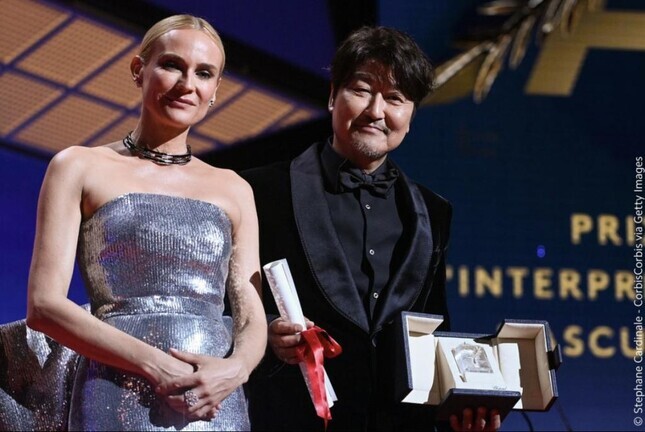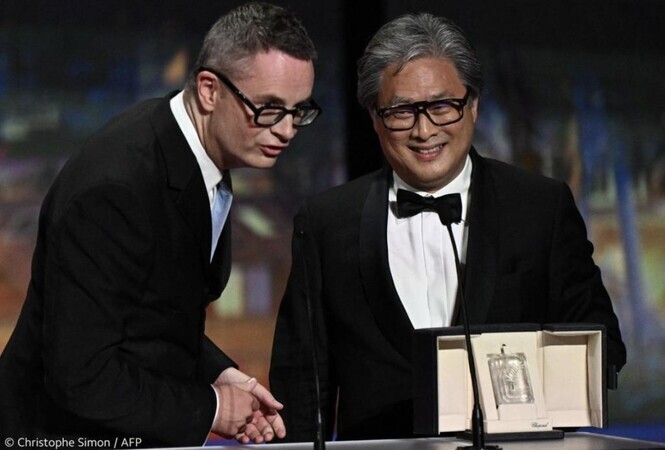hankyoreh
Links to other country sites 다른 나라 사이트 링크
Korean films steal spotlight at Cannes with wins for Song Kang-ho, Park Chan-wook

Korean films have cemented their central place in the cinema world with two major wins at the Cannes Film Festival.
South Korean films took the Best Director Award and the Best Actor Award at the 75th Cannes Film Festival, one of the most prestigious film festivals in the world, attesting to the quality and artistic merit of South Korean cinema.
Director Park Chan-wook’s “Decision to Leave” and director Hirokazu Kore-eda’s “Broker,” both of which were selected to compete for the Palme d’Or, received recognition at the festival, rewriting the history of South Korean cinema, which has been in the international limelight ever since “Parasite” won the Palme d’Or in 2019.
The first good news to come out of the Lumière Auditorium in Cannes, where the festival’s award ceremony took place, on Saturday was the announcement that Song Kang-ho had won the Best Actor Award for his role in “Broker” — marking the first time a South Korean male actor was being recognized for his performance at a “Big Three” film festival (Cannes, Berlin, and Venice).
When the news reached the press center, applause erupted from South Korean reporters who had traveled to France to cover the occasion.
When his name was called, Song embraced Kore-eda and Gang Dong-won, who were sitting on either side of him, and walked up the stage overcome with emotion. Once on the stage, Song thanked the audience in French and said, “I’m so, so thankful and honored. I express my deep gratitude to director Kore-eda, who is a great artist.”
He continued, “I want to express my deep thanks to and share this honor with [my co-stars] Gang Dong-won, Lee Ji-eun, Lee Joo-young, and Bae Doo-na,” adding, “I believe this will be a huge gift to my loving family, who came here with me. I dedicate the glory of this trophy and eternal love [to them].”
Song made an impressive performance as Sang-hyeon, an illegal adoption broker who is nevertheless portrayed as having good intentions, in Kore-eda’s “Broker,” which was selected to compete for the Palme d’Or, the highest honor at the Cannes Festival.
“Broker” is a gentle and kind-hearted road movie and the newest film by Kore-eda, a director who has expanded the definition of “family” through his work.
Song became the second South Korean actor to receive an acting award at Cannes after Jeon Do-yeon, who won the Best Actress Award at the film festival in 2007 for her role in “Secret Sunshine.” He is the third Asian male actor to be honored with a Best Actor Award at Cannes after Tony Leung, who received the prize in 2000 for his role in “In the Mood for Love,” and Yagira Yuya, who was recognized in 2007 for his role in “Nobody Knows.”
As this year marked the seventh time Song was invited to attend the Cannes Festival, many predicted a Best Actor win for Song when news broke that “Broker” was invited to the festival as well.
But the good news for South Korean cinema didn’t stop there. After Song received his award, Park’s name was called as the winner of the Best Director Award.

After embracing Park Hae-il, Park Chan-wook made his way onto the stage with a big smile on his face. He said, “As it experienced the COVID-19 pandemic, humanity sometimes raised its borders to incredible heights, but it was also able to share a unified fear and concern with each other.” He continued, “There were times when viewers stopped watching films and going to theaters, but we all had as big a chance to realize how precious theaters are.”
“As much as we had the hope and strength to overcome this epidemic, I believe we filmmakers will keep on defending the theater and forever preserve movies.”
Park also added, “Thank you to CJ ENM, CJ Vice Chairperson Lee Mie-kyung, screenwriter Jeong Seo-kyeong, and all the crew for their unsparing support in making this movie. [. . .] More than anything, my love for Park Hae-il and Tang Wei cannot be described in words.” He concluded his speech by saying, “I will spare the details for now.”
Park Chan-wook’s newest film “Decision to Leave” is a love story at once familiar and novel rendered as a movie, the artistic form that has captured the cinematic maestro who has been acknowledged by Cannes time and time again. The film portrays with simplicity the intimate love between two people who do not share a language by employing dramatic techniques reminiscent of classic detective films without including scenes of graphic violence or sex.
Park Hae-il and Tang played leading roles in the film.
Park Chan-wook, who was selected to compete for the Palme d’Or at Cannes for the first time in 2004 for “Oldboy,” received the festival’s second-most prestigious award, the Grand Prix, at the time. Five years later, in 2009, he was invited to compete again for the festival’s highest honor for his movie “Thirst,” for which he earned the Jury Prize. In 2016, Park was once again selected to compete for the Palme d’Or for “The Handmaiden,” but walked away empty-handed that year.
Park received his third Cannes trophy with this year’s Best Director Award.
Meanwhile, the Palme d’Or for this year’s Cannes Festival was given to “Triangle of Sadness” directed by Ruben Östlund. The Grand Prix was jointly awarded to Lukas Dhont’s “Close” and Claire Denis’ “Stars at Noon.” The Best Screenplay Award was given to Tarik Saleh’s “Boy from Heaven,” while the Best Actress Award was granted to Zar Amir Ebrahimi for her role in “Holy Spider.”
The Jury Prize was jointly awarded to Charlotte Vandermeersch and Felix Van Groeningen’s “The Eight Mountains” and Jerzy Skolimowski’s “EO.” Jean-Pierre and Luc Dardenne’s “Tori and Lokita,” which was considered a strong contender for the Palme d’Or, received the 75th Anniversary Prize.
The Palme d’Or for Short Films was awarded to “The Water Murmurs” by Jianying Chen. The Caméra d’Or, a prize for first-time directors for which Lee Jung-jae was discussed as a strong contender, was given to “War Pony” directed by Riley Keough and Gina Gammell.
By Oh Seung-hun, staff reporter
Please direct questions or comments to [english@hani.co.kr]

Editorial・opinion
![[Column] The state is back — but is it in business? [Column] The state is back — but is it in business?](https://flexible.img.hani.co.kr/flexible/normal/500/300/imgdb/original/2024/0506/8217149564092725.jpg) [Column] The state is back — but is it in business?
[Column] The state is back — but is it in business?![[Column] Life on our Trisolaris [Column] Life on our Trisolaris](https://flexible.img.hani.co.kr/flexible/normal/500/300/imgdb/original/2024/0505/4817148682278544.jpg) [Column] Life on our Trisolaris
[Column] Life on our Trisolaris- [Editorial] Penalties for airing allegations against Korea’s first lady endanger free press
- [Editorial] Yoon must halt procurement of SM-3 interceptor missiles
- [Guest essay] Maybe Korea’s rapid population decline is an opportunity, not a crisis
- [Column] Can Yoon steer diplomacy with Russia, China back on track?
- [Column] Season 2 of special prosecutor probe may be coming to Korea soon
- [Column] Park Geun-hye déjà vu in Yoon Suk-yeol
- [Editorial] New weight of N. Korea’s nuclear threats makes dialogue all the more urgent
- [Guest essay] The real reason Korea’s new right wants to dub Rhee a founding father
Most viewed articles
- 1[Column] Why Korea’s hard right is fated to lose
- 2Amid US-China clash, Korea must remember its failures in the 19th century, advises scholar
- 3[Column] The state is back — but is it in business?
- 460% of young Koreans see no need to have kids after marriage
- 5AI is catching up with humans at a ‘shocking’ rate
- 6Hybe-Ador dispute shines light on pervasive issues behind K-pop’s tidy facade
- 7Japan says it’s not pressuring Naver to sell Line, but Korean insiders say otherwise
- 8S. Korean chaebols comprise 84% of GDP but only 10% of jobs
- 9[Column] Can Yoon steer diplomacy with Russia, China back on track?
- 10Gangnam murderer says he killed “because women have always ignored me”